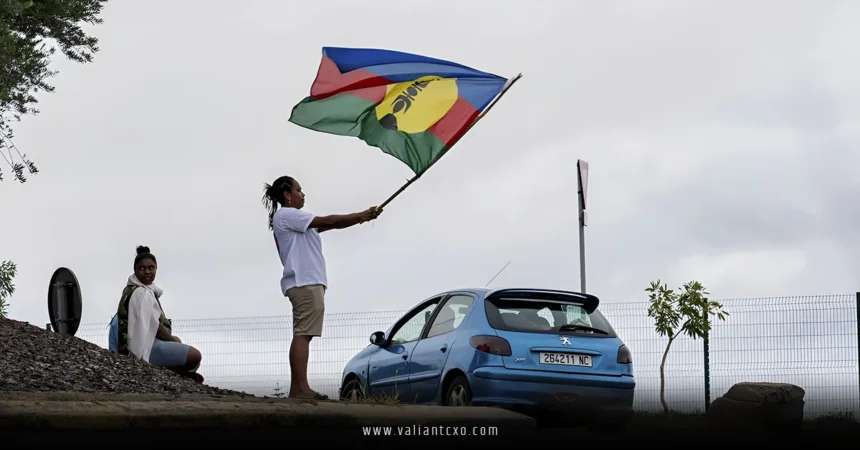New Caledonia separatists reject agreement with France, and the ripple effects are shaking the Pacific. Picture this: a small island nation, lush with tropical beauty and rich in nickel, caught in a tug-of-war between its indigenous roots and its colonial past. The Kanak people, who’ve called New Caledonia home for thousands of years, are pushing back against a deal they see as a betrayal of their dreams for independence. But why? What’s driving this rejection, and what does it mean for the future of this French territory? Let’s unpack this complex story, step by step, with a conversational lens to make sense of it all.
The Heart of the Matter: Why New Caledonia Separatists Reject Agreement with France
At the core of this issue is a clash of visions. The Kanak population, who make up about 40% of New Caledonia’s 280,000 residents, has long sought sovereignty. Their fight isn’t new—it’s been simmering since France claimed the islands in 1853. Fast forward to today, and the New Caledonia separatists reject agreement with France because they believe it undermines their push for self-determination. The agreement in question, often tied to political and economic reforms, is seen as a half-measure that keeps New Caledonia tethered to French control rather than granting full independence.
Imagine you’re renting a house, but the landlord keeps deciding what color you can paint the walls. That’s how the Kanaks feel—France offers some autonomy, but not enough to call the shots. The rejection isn’t just about saying “no” to a deal; it’s a loud cry for respect, identity, and the right to shape their own future. The separatists argue that the agreement doesn’t address core issues like land rights, cultural preservation, or equitable wealth distribution from New Caledonia’s lucrative nickel industry.
A Brief History of New Caledonia’s Independence Movement
To understand why New Caledonia separatists reject agreement with France, we need a quick history lesson. New Caledonia’s path to this moment is paved with struggle. The Kanak uprising in the 1980s, known as the “Events,” was a bloody chapter where clashes between pro-independence groups and French forces led to dozens of deaths. This unrest birthed the 1988 Matignon Accords, which promised economic development and a gradual transfer of power. Later, the 1998 Nouméa Accord set the stage for three referendums on independence, held between 2018 and 2021.
Here’s the kicker: all three referendums resulted in a “no” to independence, but the process was far from smooth. The final vote in 2021 was particularly contentious. New Caledonia separatists reject agreement with France in part because they boycotted this referendum, citing unfair timing during the COVID-19 pandemic, which hit Kanak communities hard. They argued that mourning traditions and health concerns prevented full participation, skewing the results. The turnout was a measly 43.9%, compared to over 80% in the prior votes. For separatists, this wasn’t a fair shot at freedom—it was a rigged game.
What’s in the Agreement That New Caledonia Separatists Reject?
So, what’s in this agreement that’s got everyone so heated? While specifics can vary, the rejected proposals often revolve around constitutional reforms, economic partnerships, and power-sharing arrangements. France has pushed for a “shared sovereignty” model, where New Caledonia gets more local control but remains under French oversight. Think of it like letting a teenager borrow the car but keeping the keys under your pillow at night. For the Kanaks, this doesn’t cut it.
New Caledonia separatists reject agreement with France because it often fails to address key demands:
- Land Rights: The Kanak people want ancestral lands returned, which were taken during colonial times.
- Economic Equity: New Caledonia’s nickel mines are among the world’s largest, yet much of the wealth flows off-island. Separatists demand a fairer share.
- Cultural Recognition: The Kanak identity, language, and traditions need stronger protection, which many feel the agreement sidesteps.
The separatists see these agreements as France’s attempt to maintain influence while offering just enough to quiet dissent. It’s like offering a starving person a cracker and calling it a meal—technically, it’s something, but it’s not enough to satisfy.
The Role of Referendums in Shaping the Debate
The three referendums (2018, 2020, and 2021) were supposed to settle the independence question, but they’ve only fanned the flames. In 2018, 56.7% voted to stay with France; in 2020, it was 53.3%. The margins were shrinking, signaling growing support for independence. But the 2021 referendum, with its boycott and low turnout, threw a wrench in the works. New Caledonia separatists reject agreement with France because they view the referendum results as illegitimate, arguing that France pushed ahead despite their protests.
This isn’t just about numbers—it’s about trust. The Kanaks feel France didn’t play fair, rushing the vote during a crisis. Imagine planning a family meeting to decide who inherits the house, but scheduling it when half the family is at a funeral. That’s the kind of resentment fueling the rejection of France’s latest proposals.
Why Does This Rejection Matter?
New Caledonia separatists reject agreement with France, and the stakes are higher than you might think. This isn’t just a local squabble—it’s a geopolitical chess game. New Caledonia’s strategic location in the Pacific makes it a prized asset for France, giving them a foothold in a region where China’s influence is growing. Losing New Caledonia could weaken France’s global clout, while for the Kanaks, it’s about reclaiming their destiny.
The rejection also risks reigniting tensions. In May 2024, protests over electoral reforms turned violent, with barricades, burned cars, and a state of emergency declared. The unrest left nine dead and hundreds injured, showing how quickly things can escalate. New Caledonia separatists reject agreement with France not just as a political stance but as a warning: without genuine dialogue, peace is fragile.
The Kanak Perspective: A Fight for Identity
For the Kanak people, this isn’t just politics—it’s personal. Their culture, tied to the land and sea, is at risk of being overshadowed by French influence and settler populations. New Caledonia separatists reject agreement with France because they see it as a threat to their way of life. Imagine your family’s heirloom recipe book being rewritten by someone else—that’s the kind of loss they’re fighting against.
The Kanaks also point to economic disparities. While New Caledonia’s nickel industry generates billions, many Kanak communities live in poverty. The wealth gap fuels resentment, making France’s offers of “partnership” feel like empty promises. Why share the table when you’re only getting crumbs?
France’s Response: A Delicate Balancing Act
France isn’t sitting idly by while New Caledonia separatists reject agreement with France. President Emmanuel Macron has tried to play mediator, visiting New Caledonia in 2023 to push for dialogue. France’s strategy is to offer enough autonomy to keep the territory in the fold without granting full independence. It’s a tightrope walk—too much freedom, and they lose control; too little, and they risk rebellion.
France has also beefed up security, sending police reinforcements to quell unrest. But this has backfired, with accusations of heavy-handed tactics alienating the Kanaks further. It’s like trying to fix a broken friendship by shouting louder—sometimes, listening works better.
The International Angle: Who’s Watching?
The world is watching New Caledonia’s drama unfold. Neighboring Pacific nations, many with their own colonial histories, sympathize with the Kanaks. Groups like the Pacific Islands Forum have called for fair processes, while global powers like China and the U.S. keep an eye on the region’s stability. New Caledonia separatists reject agreement with France, and it’s not just a local issue—it’s a test of how colonial powers handle decolonization in the 21st century.
What’s Next for New Caledonia?
So, where does this leave us? New Caledonia separatists reject agreement with France, and the path forward is murky. Both sides need to rebuild trust, but that’s easier said than done. France could push for new talks, but they’ll need to address the Kanaks’ core demands—land, wealth, and cultural respect. The separatists, meanwhile, must decide whether to keep boycotting or engage in negotiations, knowing compromise might be their best shot at change.
The risk of violence looms large. Without a fair deal, protests could flare up again, destabilizing the region. But there’s hope, too—dialogue, if genuine, could pave the way for a model of shared governance that respects both Kanak aspirations and French interests. It’s like two dancers learning a new routine: they’ll step on each other’s toes, but with practice, they might find harmony.
How Can Dialogue Move Forward?
For New Caledonia separatists reject agreement with France to lead to progress, both sides need to listen. France could start by acknowledging the 2021 referendum’s flaws and offering a new vote under fairer conditions. The Kanaks, in turn, could clarify their vision for independence—would it mean total separation or a looser federation? Transparency and mutual respect are the keys to unlocking this stalemate.
Conclusion: A Crossroads for New Caledonia
New Caledonia separatists reject agreement with France, and the world is watching to see what happens next. This isn’t just about a single deal—it’s about a people’s fight for identity, justice, and a future they can call their own. The Kanaks’ rejection signals a deep desire for change, but it also highlights the challenges of balancing colonial legacies with modern aspirations. As tensions simmer, the path to peace lies in honest dialogue, mutual respect, and a willingness to rethink what “agreement” really means. Let’s hope both sides can find common ground before the Pacific’s paradise becomes a battleground. Keep an eye on this story—it’s far from over.
FAQs
1. Why do New Caledonia separatists reject agreement with France?
New Caledonia separatists reject agreement with France because they believe it fails to grant true independence, sidelining demands for land rights, economic equity, and cultural recognition. They see it as a way for France to maintain control while offering minimal concessions.
2. What was the controversial 2021 referendum in New Caledonia?
The 2021 referendum, the third in a series, saw a majority vote to stay with France, but New Caledonia separatists reject agreement with France tied to this vote, boycotting it due to unfair timing during the COVID-19 pandemic, which led to low turnout and disputed results.
3. How does the nickel industry factor into New Caledonia’s tensions?
New Caledonia’s nickel industry is a major economic driver, but much of the wealth bypasses Kanak communities. Separatists reject agreements with France that don’t address this disparity, demanding a fairer share of profits.
4. What role does France play in New Caledonia’s current situation?
France governs New Caledonia as an overseas territory, offering partial autonomy through agreements. However, New Caledonia separatists reject agreement with France, viewing it as insufficient to meet their goals of full sovereignty and cultural preservation.
5. Could violence escalate if New Caledonia separatists reject agreement with France?
Yes, past protests, like those in 2024, turned violent, with deaths and injuries. If New Caledonia separatists reject agreement with France without new talks, tensions could flare again, risking further unrest.
For More Updates !! : valiantcxo.com


